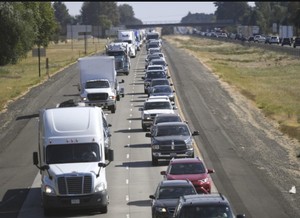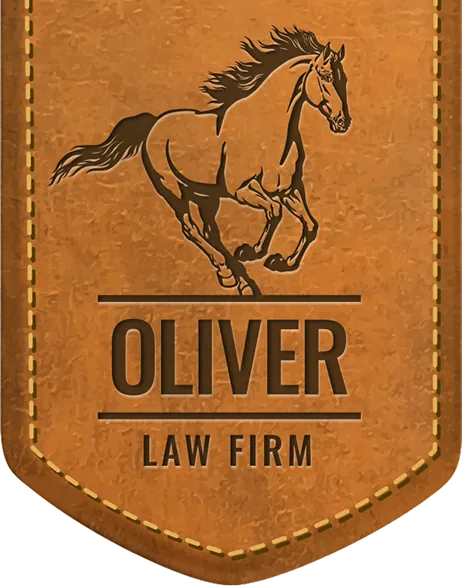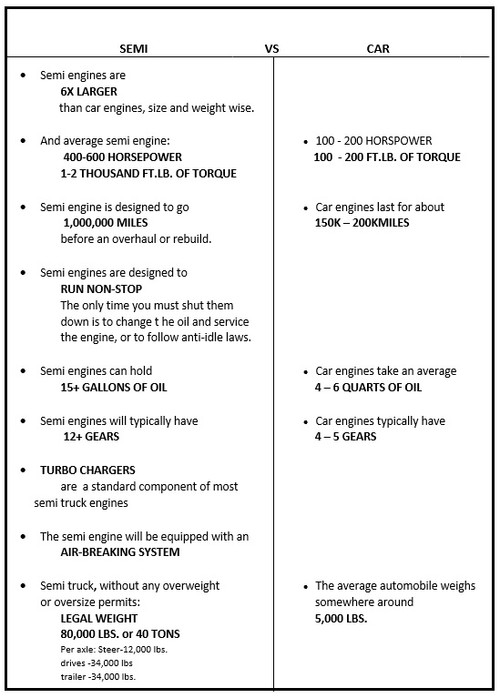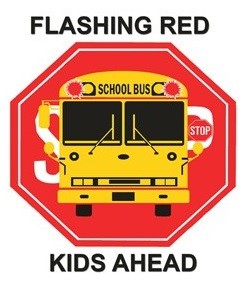I 
- An 18 wheeler’s average lenth varies greatly depending on the type of cab they are driving. —70 – 80 FT– Length of an 18 wheeler’s cab is measured from the center of the rear wheel to the center of the seer axle. STANDARD HEIGHT – 13’ 6”; WHEELBASE 245” – 265”
- Semi trucks require 40% GREATER TIME TO STOP VS. CARS. Factors in the length of time needed to stop an 18 wheeler include load weight, bobtailing and road conditions.
- 18 Wheeler – TURNING RADIUS: AVERAGE TURNING RADIUS – 55 FT.; ROAD WIDTH – 24 FT. (General U.S. lane width is 12 ft.).
- COST: Up to $260,000 OR MORE. Semi trailer: $30,000 – $80,000. Semi truck: $130,000 – $180,000
DEFINITIONS
THE FIFTH WHEEL: The fifth wheel on an 18 wheeler is a round plate above the drive tires that couples (hooks together) the trailer to the truck.
KINGPIN: The heavy metal cylindrical pin that is located underneath the front end of the trailer, is the KINGPIN. The kingpin is the mechanism on the trailer that locks it to a road tractor. It is typically positioned between 18” to 48” from the trailer nose. A greased metal grid plate surrounds the kingpin. This grid plate allows the fifth wheel to slide underneath the trailer. When the tractor is backed into the nose of a trailer, the fifth wheel pivots and slides underneath the trailer’s grid plate. The fifth wheel then locks on to the trailer’s kingpin.
BOBTAILING: When a truck is driving WITHOUT the trailer attached, it’s called BOBTAILING. In wet weather, bobtailing trucks may be more dangerous because the truck handles very differently without the trailer attached
GEARS: The most common amount of gears in an 18 wheeler today: 10 FORWARD and 2 REVERSE.
Double Clutching and “Floating: A “double-clutch” technique is used by 18 wheeler drivers for shifting. Shifting gears in a car with a standard transmission is very different than shifting gears in an 18 wheeler. In a car the rpm’s match up and in a truck they do not, therefore the clutch is depressed and then depressed again to “match” the gears with the rpm’s. Most 18 wheeler drivers use what they call “floating” which does NOT use the clutch at all except to start and stop. “Floating” is the preferred method. An acquired skill that takes some practice to get used to, “Floating” saves fuel (when done properly) and saves wear and tear on the equipment.
TANDEM: Referring to a set of 2 tires on a tractor-trailer as tandem is incorrect. These are more commonly known as double wheels, dual tires or “dualies.” They are used for safety (redundancy) so if one tire blows the others will continue to hold up until the tire is repaired. A set of 2 axles, with one axle immediately following the other is the correct definition of TANDEM. Each axle bears less weight when distributing the load over 2 axles. Because there are laws limiting the amount of weight that canbe carried on each axle, distributing the weight over more axles allows a greater total amount of weight to be carried.
AXLES: An 18 wheeler has a total of 5 axles.
DOUBLES (TWINS, TWIN TRAILERS): Combination of a tractor and two semi trailers connected in tandem by a converter dolly.
TRIPLE TRAILER 18 WHEELERS: 13 western states where roads are flat and straight, allow triple trailers: Arizona, Colorado, Idaho, Indiana, Kansas, Montana, Nebraska, Nevada, North Dakota, South Dakota, Oklahoma, Oregon and Utah. Ohio also allows triple trailer 18 wheelers.
ANTI-LOCK BRAKING SYSTEMS (ABS): Anti-lock braking systems are required on tractors that were manufactured on or after March 1, 1997, and air-braked semi-trailers and single-unit trucks that were manufactured on or after March 1, 1998.
________________________________________
If you’ve been involved in a wreck with an 18-wheeler, call me – 479-202-5200, or click the CHAT NOW at the top of this page. Oliver Law Firm, 3606 W. Southern Hills Blvd., Ste. 200, Rogers, AR 72758. Located at Exit 81 off Pleasant Grove Road, just west of I-49.
a Free Consultation




